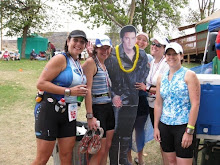By Amanda McCracken
D3Multisport.com
You've diligently logged your miles, your time, your heart rate, your hours of sleep and perhaps even your daily caloric intake. You've followed your plan to a "T" and religiously nailed your workouts day after day. You even skipped the biggest barbecue party of the summer because it was two nights before your big race (the most important night of sleep). The only room for error is misfortune (flat tire or bad weather), right?
Wrong! Here are five important practices that are often overlooked on the way to the start line.
#5: Check your gear.
Are your tires pumped? Do you have a spare tube and a CO2 cartridge in case of a flat tire? Do you have an extra pair of goggles? Do you have body glide to ease out of wetsuit transition and prevent chafing? Are your shoes laced with the elastic laces for easy on and off removal? Are the laces so tight they are going to create a bruise over the top arch of your foot? Ladies, do you have extra tampons in your bag in case of a race morning surprise? If you are using deep dish wheels, be sure to bring the adapter to pump your tires.
#4: Rehearse transition and warm up before your swim.
Many of you know that the number one rule of transition is NOT to be in transition! Ideally you've practiced your transitions during training but did you also visualize the perfect transition on race morning? Have you rehearsed the steps in your mind?
Entering the water is really your first "transition". Get in the water for a short warm-up (even if just for a few bobs) before the start of the swim. This helps your body get accustomed to the temperature of the water, which helps pave the way for a calmer swim start.
Remember, excellent transition times can be the difference between several age group places.
#3: Be diligent about nutrition.
While this is an immensely dense subject, I want to highlight a few things to remember. Be sure to eat your dinner (low in fiber) about 12 hours before your wave starts so that your body has time to digest it all. If you can manage getting up early enough, eat your breakfast about two to three hours before the start of your race. Make sure your bottles are full of the fuel you used in training. Pack extra gels that you know your stomach can digest. Depending on the heat and length of your race, you should have a couple of electrolyte tabs on hand, too.
It's easy to get distracted during the race and forget to address your nutritional needs until it's too late. Before your race, draw up a nutrition map. Figure out when you are going to take gels and how much/how often you will hydrate.
#2: Know the course.
If you live close to the race site, you should pre-ride the course. If you don't have time or energy to ride/run the course, then drive it the day before. Do you know where the hills are located? How about the wicked potholes and the sharp downhill turns?
Then scope out the swim course and take a mental note of where the main buoys are located.
Finally, know where the run/bike in and out spots are located, and where the finish line is. I like to run the last 400-meter stretch before the race so I have a good reference for when to pick up the pace. Don't let an athlete outrun you for a first place age group award simply because you think the finish line is further away than it actually is.
#1: Tame your mind.
Triathletes often psyche themselves out before the race even starts. Avoid over analyzing the way your body feels the week before the race. Tell yourself it's a well-trained machine that's ready to perform.
When you get to the race, keep your "blinders" on. Don't let the looks of someone's solid six pack or shiny deep dish wheels intimidate you. Remember, it's the motor inside that really matters.
Be sure you have a script that you've rehearsed to help battle the potential negative talk, fear and panic in the race. What are you going to tell yourself when your legs feel like lead and you've just been passed by your ex's new flame? Make sure you've got a mantra you can peel out of your sticky gel pocket to do battle. I like to draw out my own "word map" of the course. What am I going to tell myself when I get to point "X"?
Being mindful of the details can help prevent things like getting a DNF (Did Not Finish) due to a flat tire, panicking in the water, bonking, getting lost, or mentally cracking. Simply plan ahead and keep your mind in check.
Subscribe to:
Post Comments (Atom)





















No comments:
Post a Comment